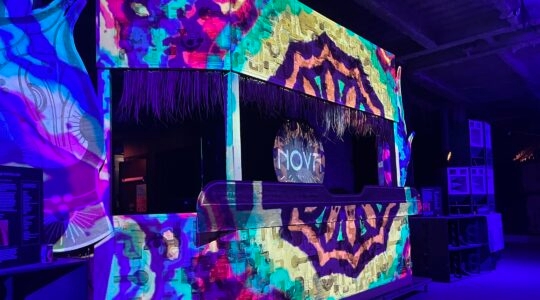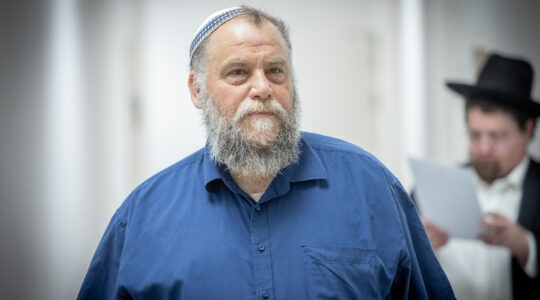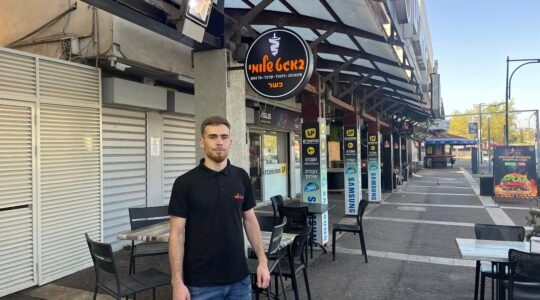NAZARETH, Israel (JTA) — Amid the tolling of this city’s church bells, Marwan Bahous and his family hurry across the wide stone plaza leading into one of Israel’s holiest Christian sites: the basilica where tradition says the angel Gabriel visited Mary to say she would give birth to Jesus.
Bahous, 56, a Catholic from the Arab town of Shfaram, tries to bring his teenage children here regularly for Mass to instill in them that they are part of something larger than their own small community of Christians in Israel.
“We want to preserve our heritage for our children,” Bauhaus told JTA. “It can feel very lonely here. We are a minority within a minority.”
Approximately 120,000 Christians live in Israel, making up just 2 percent of the total population. It’s a percentage that has dwindled steadily since the establishment of Israel, as Jewish and Muslim populations have grown.
Contributing to their shrinking numbers Christians, considered the most highly educated group in the country, have a relatively higher level of emigration and a birthrate that is the lowest nationally among the three religions.
“In the world, Christianity is a huge force, even if here, where Christianity began, it is not,” Bahous said.
Ahead of Pope Benedict XVI’s arrival here next week, local Christians are hoping the papal visit will bring attention to their community and its challenges.
Christians in Israel, the majority of whom live in the Galilee, have something of a splintered identity (Palestinian Christians live mostly in Bethlehem and West Bank villages near Jerusalem). They comprise 8 percent of the 1.5 million Arabs in Israel and face much of the same discrimination that Muslim Israelis do when it comes to employment and suspicion about political loyalties.
Even though Christians often are at the forefront of radical identity politics here, Israeli Jews tend to view them as culturally closer to them than Muslim Arabs and less of a potential security threat than Muslims. And in a society largely divided on ethnic lines, Jews tends to mix more socially with Christians than Muslims.
“They are stuck between a hammer and an anvil because they are linked to both sides of the conflict here,” said Daniel Rossing, director of the Jerusalem Center for Jewish-Christian Relations, which offers courses for Jewish Israelis about the local Christian community. “Culturally and in terms of language and national identity, they are linked to the Muslims. But in their ties to the Hebrew Bible and their Western orientation, they connect to Israeli society.”
Rossing sees parallels in the Christian Arab experience in Israel to that of Diaspora Jews.
Noting that Christian private schools regularly boast the country’s highest matriculation exam scores, he observes, “It’s the classic Jewish story — because you are small, you try to excel and do better.”
Christians here have taken on prominent leadership roles in the Arab sector disproportionate to their numbers. For example, Christians can be found in the leadership of Arab political parties and prominent civil rights groups.
Like their co-religionists in neighboring Lebanon and the West Bank, many Christians are outspoken voices for Arab nationalism. That has been an avenue for social acceptance by their fellow Muslims. It’s a way, some observers say, to stress their national ties over religious ones.
Some Israeli Christians, especially among the younger generation, are among Israel’s most strident voices for forging a Palestinian identity over an Israeli one.
A significant number of the community’s emerging activists are graduates of St. Joseph’s School in Nazareth — a complex of courtyards, buildings and playgrounds in the hills above the city known for its academic excellence.
For the past 30 years it has been led by the Rev. Emil Shoufani, a Catholic priest. Sitting in his office overlooking a basketball court where Muslim and Christian students play together during a break, Shoufani speaks of the dangers of religious identity superseding civic ones in a country like Israel.
“If we keep on this path, the conflict will tilt towards a religious one,” Shoufani said. “With fear, everyone retreats to their own ghetto.
“The goal today should be to live shared lives,” he adds.
As part of his mission to break people out of their communal shells, Shoufani took a group of Israeli Christians, Muslims and Jews to Auschwitz in 2003.
Shoufani says he is pained when he sees his fellow Christians leaving Israel but understands their motivation.
“Christians look toward a better quality of life; they are looking for quiet and stability,” he said. “Because the situation is difficult, people look for other places to live.”
Most, however, choose to stay in Israel.
“The community lives with hope for a better future,” said Wadee Abunassar, a political consultant who lives in Haifa and is serving as the spokesman for the local Latin patriarch during the pope’s visit. “As part of the Arab community, Christians in Israel share the hopes of fellow Arabs — namely peace and equality. So far, unfortunately, there is neither peace nor equality.”
Abunassar says Christians here want to play an active role in making Israel a better place for all of its citizens.
“We are an integral part of the society in which we live,” he said. “We are neither Muslims nor Jews, but we are Israeli.”





